译林牛津版七年级下册英语全册课件
合集下载
牛津译林版七年级英语下册《Unit1 Dream homes Main_Task》精品课件
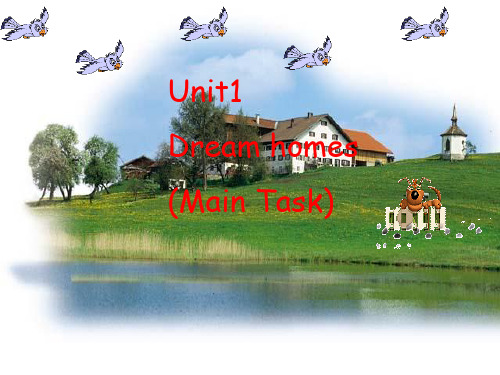
Surname _________________
personal First name___________________
information Age _____________ telephone number_____
Address________________
What kind of home do you live in ?
Read and find the information about Simon’s dream home:
his family members: many friends
furniture:
bed, shower, bath
Read and find the information about Simon’s dream home:
What do you think of my dream home?
• Dream home: large near the sea
•
many trees
• Rooms: 10 rooms
• Floors:
• on the ground floor: a library
• on the first floor: a big kitchen
Do you live in a house or a flat?
tHhoewnmuamnybfleororosfartehtehefrleooinrysouinr hyoouuser/ hbuoilmdineg? Hthowe mnaunmy rboeomr sodf othyeourhoaovme insyionuryhooumreh?ome
Read more carefully and complete the passage:
苏教牛津译林版初中英语七年级下册Unit 7 Abilities2PPT课件
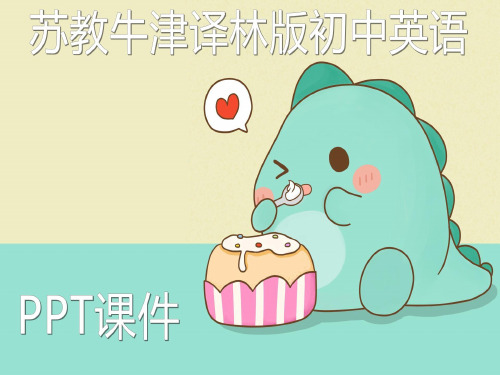
What can we learn from the story?
It is important to be careful with fire. And we should help each other.
Discussion: Right or wrong
1
2
3
4
5
6
7
8
Hale Waihona Puke rong1We can’t play with matches. We should be careful with matches.
3. Why couldn’t his neighbour Mrs Sun get out? She couldn’t get out because she hurt her leg.
4. What did Lin Tao do? Zhang Hua quickly ran back to his flat and poured water over his jacket. Then he rushed into Mrs Sun’s kitchen to save her....
Questions:
1. When was Lin Tao at home alone? Zhang Hua was at home alone on 10th May.
2. What did he see from next door? He saw a lot of smoke from next door.
Right
2
When there is a fire , we should call 119 at once.
Wrong
3
We can’t put anything hot into the rubbish bin.
牛津译林版七年级英语下册Unit7 Abilities课件(14张)
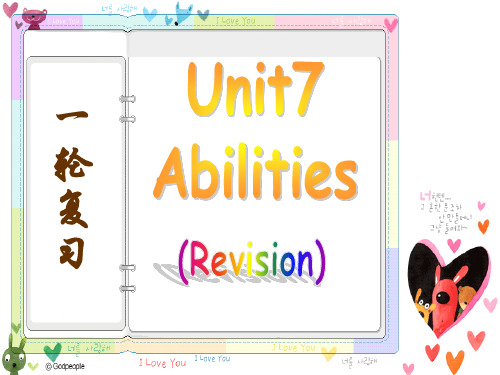
Can
1. was able ytoo/uchouelldp me?
2. He
play
the pwiiallnboe aabtlethtoe age of 6. 3. He
ride a bike in 3 days.
4. A: CoucladnI use your eraser?
B: Yes, you could .
A. can jumps B. can’t jump
C. cans jump D. can jump
4.I _C___ play tennis five months ago, but now I
can.
A. could B. can’t C. couldn’t D. can
用can could或be able to填空
What a clever boy he is!
b) 多么好的天气!
What fine / good weather (it is)!
c) 这是本有趣的书啊!
What an interesting book this is!
d) 这些是多么漂亮的画!
What beautiful flowers these are!
wet blanket over Mrs. Sun and helped her out. Later some f_ir_e_m_e_n_(消防员) came and put out the fire. The fire b_u_r_n_t _ Lin Tao’s arms, neck and face. He was in h_o_s_p_it_a_l_ for two weeks. When he was there, many people
《 Revision》课件 牛津译林版七年级英语下册

3. —___M__a_y___ I use your mobile phone? —Of course , you may.
4. —___C_a_n___ you come to our party tomorrow? —Sure.
5. Tom __c_a_n_'_t__ be at home. Look! The light in his room is off.
2. take an active part in 3. hear from =receive a letter
from 4. get lost= lose one’s way 5. give a seat to someone in
need 6. believe it or not 7. be careful =look out 8. stop sth from burning 9. put out fire
10.be at home alone
Role-playing Game
1
Helping Hands Club
clean u清p t理he公pa园rk 公gi交ve车a s上eat让to座
someone
c为oll.e.c.t收th集ing东s f西or
r为ais.e..募mo集ne资y f金or v参isi观t an老o人ld 之peo家ple's
Key words 1. ability- abilities (pl.)-able (adj.) be able
to do sth.
1. 能力
2. believe -believe it or not
2. 相信
3. raise - raise money/ raise pets
4. —___C_a_n___ you come to our party tomorrow? —Sure.
5. Tom __c_a_n_'_t__ be at home. Look! The light in his room is off.
2. take an active part in 3. hear from =receive a letter
from 4. get lost= lose one’s way 5. give a seat to someone in
need 6. believe it or not 7. be careful =look out 8. stop sth from burning 9. put out fire
10.be at home alone
Role-playing Game
1
Helping Hands Club
clean u清p t理he公pa园rk 公gi交ve车a s上eat让to座
someone
c为oll.e.c.t收th集ing东s f西or
r为ais.e..募mo集ne资y f金or v参isi观t an老o人ld 之peo家ple's
Key words 1. ability- abilities (pl.)-able (adj.) be able
to do sth.
1. 能力
2. believe -believe it or not
2. 相信
3. raise - raise money/ raise pets
牛津译林版七年级英语下册unit2 welcome to the unit课件
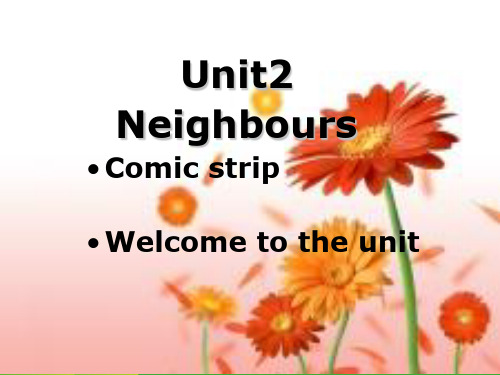
大部分水是干净的。
_M__o_s__t ___o_f_ _t_h_e__ _w_a_t_e_r__ __i_s____ clean.
3.以-or结尾的表示人的名词有:
男演员_a_c_t_o_r 收集者_c_o_l_le_c_t_o_r 医生_d_o_c_t_o_r
访问者、参观者_v_i_s_it_o_r__ 发明家_i_n_v_e_n_t_o_r_。
the Great Wall.
3.Look! Three policemen _a_r_e__r_u_n_n_i_n_g_ (run)
after a thief along the street.
4.Don’t worry. You should call the police
___fi_r_s_t___(one) for help.
你的阿姨在哪工作?在医院。
Where _d_o__e_s_ your __a_u__n_t __w_o_r_k__ ? She _w__o_r_k_s_ __i_n___ a __h_o_s__p_it_a_l__.
5.like (介词)像(反义词)不像_u_n__li_k_e__。 词组:_b__e_l_i_k_e_…____/____l_o_o_k__li_k_e__…__
其余以-er结尾为主表示人的名词:
服务员______: 工人______, 作者_______,
游泳者w__a_i_te__r___, 读者wo__rk_e__r___,writer
跑步者s_w__im__m__e_r__ ,运动re员ad_e_r__________,
女儿 ____r_u_n_n_e_r__. daughter
He __l_o_o_k_s__ __l_ik__e__ his father. He __l_i_k_e_s__ his father.
_M__o_s__t ___o_f_ _t_h_e__ _w_a_t_e_r__ __i_s____ clean.
3.以-or结尾的表示人的名词有:
男演员_a_c_t_o_r 收集者_c_o_l_le_c_t_o_r 医生_d_o_c_t_o_r
访问者、参观者_v_i_s_it_o_r__ 发明家_i_n_v_e_n_t_o_r_。
the Great Wall.
3.Look! Three policemen _a_r_e__r_u_n_n_i_n_g_ (run)
after a thief along the street.
4.Don’t worry. You should call the police
___fi_r_s_t___(one) for help.
你的阿姨在哪工作?在医院。
Where _d_o__e_s_ your __a_u__n_t __w_o_r_k__ ? She _w__o_r_k_s_ __i_n___ a __h_o_s__p_it_a_l__.
5.like (介词)像(反义词)不像_u_n__li_k_e__。 词组:_b__e_l_i_k_e_…____/____l_o_o_k__li_k_e__…__
其余以-er结尾为主表示人的名词:
服务员______: 工人______, 作者_______,
游泳者w__a_i_te__r___, 读者wo__rk_e__r___,writer
跑步者s_w__im__m__e_r__ ,运动re员ad_e_r__________,
女儿 ____r_u_n_n_e_r__. daughter
He __l_o_o_k_s__ __l_ik__e__ his father. He __l_i_k_e_s__ his father.
牛津译林版英语七年级下册Unit 2 Neighbours 第一课时 课件

I’m afraid 恐怕,口语习惯表达 恐怕明天要下雨了。 I’m afraid it is going to rain tomorrow. 恐怕我妈妈没有时间陪我玩了。
I’m afraid my mother has no time to play with me.
Role play the conversation with your partner.
What’s your neighbour?
A: What does your neighbour do? B: He/She is a/an...... A: Where does he/she work then? B: He/She works ...... A: What about you? B: I want to be .......and work......
teacher student
school
Do you know what they are and where they work?
farmer
on a farm
Do you know what they are and where they work?
office worker
in an office
Listen and answer
Eddie and Hobohat are they going to do? They are going to visit their new neighbours. Will Eddie go and visit the new neighbours? Yes ,he will.
Help Simon to complete his article with the words in the box.
I’m afraid my mother has no time to play with me.
Role play the conversation with your partner.
What’s your neighbour?
A: What does your neighbour do? B: He/She is a/an...... A: Where does he/she work then? B: He/She works ...... A: What about you? B: I want to be .......and work......
teacher student
school
Do you know what they are and where they work?
farmer
on a farm
Do you know what they are and where they work?
office worker
in an office
Listen and answer
Eddie and Hobohat are they going to do? They are going to visit their new neighbours. Will Eddie go and visit the new neighbours? Yes ,he will.
Help Simon to complete his article with the words in the box.
牛津译林版七年级英语下册Unit7 Abilities Reading1 精品课件(共35张PPT)
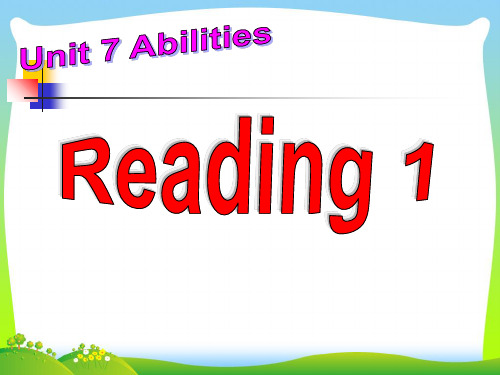
Safety is above all! 安全高于一切!
1. brave enough 2. be at home alone 3. hear sb doing sth 4. run outside 5. see a lot of smoke 6. the 79-year-old Mrs Sun 7. next door 8. be badly hurt
顺便问一下
camera
n. 照相机
no problem
没问题
X-ray
n. X光
d e a f c b
Listen and answer
1. Who’s the brave young man? Lin Tao.
2. Did the fire burn the young man?Yes, it did.
T
Learn more about fire safety.
Be careful with matches. Do not leave the stove on. Do not put anything hot into the rubbish bin. Keep long hair away from fire. Don’t play with fire. Don’t smoke on the bus./in bed, etc.
5. Don’t let children play with matches. T 6. Don’t leave the stove(炉子) on. T 7.Go swimming alone in the river. F
8.Don’t put anything hot into the rubbish bin(垃圾箱).
牛津译林初中七年级下册英语 Unit 7 Abilities》Reading 2课件

6. 我弟弟弄伤了自己的腿。 My brother hurt his own legs.
7. 那场火烧伤了她的胳膊和脸。 The fire burnt her arms and face.
1. Recite this article. 2. Remember the language points
7. 给某人带来某物 bring sb. sth.
= bring sth. to sb.
8. 小心火
be careful with fire
How much do you know about …
A brave young man!
Liu Tao Mrs Sun
_2_5__ years old a _7_9_-_y_ea_r_-_o_l_d_ woman
in this lesson.
5. a 79-year-old man 一位79岁的老人
e.g. He is a 79-year-old man.
= The man is 79 years old. 他是一位79岁的老人。
6. pour … over… 把……倾倒……
e.g. He poured milk over his shirt. 他把牛奶倾倒在他的衬衫上。
Phrases in the text.
1. 从……中救出来 2. 独自在家 3. 隔壁 4. 在那个时候 5. 扑灭火
save … from … be at home alone next door at that moment put out the fire
6. 思考,考虑
think about
3. 他妈妈昨天生病住院了。 His mother was ill and in hospital yesterday.
7. 那场火烧伤了她的胳膊和脸。 The fire burnt her arms and face.
1. Recite this article. 2. Remember the language points
7. 给某人带来某物 bring sb. sth.
= bring sth. to sb.
8. 小心火
be careful with fire
How much do you know about …
A brave young man!
Liu Tao Mrs Sun
_2_5__ years old a _7_9_-_y_ea_r_-_o_l_d_ woman
in this lesson.
5. a 79-year-old man 一位79岁的老人
e.g. He is a 79-year-old man.
= The man is 79 years old. 他是一位79岁的老人。
6. pour … over… 把……倾倒……
e.g. He poured milk over his shirt. 他把牛奶倾倒在他的衬衫上。
Phrases in the text.
1. 从……中救出来 2. 独自在家 3. 隔壁 4. 在那个时候 5. 扑灭火
save … from … be at home alone next door at that moment put out the fire
6. 思考,考虑
think about
3. 他妈妈昨天生病住院了。 His mother was ill and in hospital yesterday.
- 1、下载文档前请自行甄别文档内容的完整性,平台不提供额外的编辑、内容补充、找答案等附加服务。
- 2、"仅部分预览"的文档,不可在线预览部分如存在完整性等问题,可反馈申请退款(可完整预览的文档不适用该条件!)。
- 3、如文档侵犯您的权益,请联系客服反馈,我们会尽快为您处理(人工客服工作时间:9:00-18:30)。
favourite? 4 The biggest one in Fifth Street!
知识点 1 Would you like…? 你愿意/想……? 考向 Would you like…?表示用委婉的语气向对方提出
请求或建议,后可跟名词、代词或不定式。
肯定回答常用:(1)Yes, please. (2)Yes, I'd love(like) to. (3)That's a good/ great idea.
world. 3. Every year there are many travellers coming to oouwr n
拓展 capital作名词还可意为“大写字母”。 eg:The child writes his name in capitals. 这个孩子用大写字母写他的名字。
典例 Can you tell me the c_a_p__it_a_l __ (首都) of Canada?(阜康)
一、根据首字母或汉语提示完成句子 1. My sister's __d_r_e_a_m__ (梦想) home is in a quiet city. 2. My father likes to visit differentp_a_l_a_c_e_s__ (宫殿) all over the
4
5
the UK the 6
the CN Tower
_C__a_n_a_d__a__
Big Ben
__t_h_e__U_K___
Red Square
__R_u__ss_i_a__
B) Simon's cousin,Annie,is asking Simon questions about the places in Part A.Work in pairs and talk about them. Use the conversation below as a model. The capital of each country is listed in the box below.
否定回答常用: (1)No, thanks. (2)I'd love to, but… (3)Sorry, but I can't. (4)I'm afraid I
can't.
eg:—Would you like some bananas? 你想要一些香蕉吗? —Yes,please./No,thanks. 是的。/不要,谢谢。 —Would you like to play games with me? 你想和我一起做游戏吗? —Yes,I'd love to.是的,我想。
知识点 2 capital /'kæpɪtl / n. 首都
考向 常用结构:the capital of+地名 “……的首都(省 会)”。提问“……的首都(省会)是哪个城市?”的 问句应为“Which city is the capital of...?”。 eg:London is the capital of the UK. 伦敦是英国的首都。 Nanchang is the capital of Jiangxi. 南昌是江西的省会。
【注意】Would you like…?中通常不用any或anything, 而应用some或something,表示希望得到对方的 肯定答复。 eg:Would you like some coffee?
你要喝点咖啡吗?
典例1 —Would you like some tea?
—___A_____. (绵阳)
A.Yes, please
B.The same to you
C.Me, too
D.My pleasure
典例2 —Would you like to go to the movies with me this
evening?
—____C____, but I promised to go swimming with Eric.
A. Never mind
B. I don't think so
C. I'd love to
D. It's not a big deal
CountrSimon wants to learn about foreign countries. He collected some photos. Help him write the names of the countries under the photos.
1
Unit 1 Dream homes
课时1 Comic strip & Welcome to the unit
Do you know which country this is?
Comic strip 1 Would you like to live in a palace , Eddie? 2 No. I'd like to live next to a restaurant. 3 There are twenty restaurants in town .Which is your
Canada France Japan Russia the UK the USA
1
2
3
Mount Fuji
TowerJapan
__________
the White House
the USA
__________
the Eiffel
France
_________
Canada France Japan Russia USA
London Moscow Ottawa Paris Tokyo Washington D.C.
Annie:Which country is this photo from, Simon? Simon: Oh, it's from Japan. This is Mount Fuji. Annie: I see. Where is it? Simon: It's near Tokyo. Annie: Is Tokyo the capital of Japan? Simon: Yes, it is.
知识点 1 Would you like…? 你愿意/想……? 考向 Would you like…?表示用委婉的语气向对方提出
请求或建议,后可跟名词、代词或不定式。
肯定回答常用:(1)Yes, please. (2)Yes, I'd love(like) to. (3)That's a good/ great idea.
world. 3. Every year there are many travellers coming to oouwr n
拓展 capital作名词还可意为“大写字母”。 eg:The child writes his name in capitals. 这个孩子用大写字母写他的名字。
典例 Can you tell me the c_a_p__it_a_l __ (首都) of Canada?(阜康)
一、根据首字母或汉语提示完成句子 1. My sister's __d_r_e_a_m__ (梦想) home is in a quiet city. 2. My father likes to visit differentp_a_l_a_c_e_s__ (宫殿) all over the
4
5
the UK the 6
the CN Tower
_C__a_n_a_d__a__
Big Ben
__t_h_e__U_K___
Red Square
__R_u__ss_i_a__
B) Simon's cousin,Annie,is asking Simon questions about the places in Part A.Work in pairs and talk about them. Use the conversation below as a model. The capital of each country is listed in the box below.
否定回答常用: (1)No, thanks. (2)I'd love to, but… (3)Sorry, but I can't. (4)I'm afraid I
can't.
eg:—Would you like some bananas? 你想要一些香蕉吗? —Yes,please./No,thanks. 是的。/不要,谢谢。 —Would you like to play games with me? 你想和我一起做游戏吗? —Yes,I'd love to.是的,我想。
知识点 2 capital /'kæpɪtl / n. 首都
考向 常用结构:the capital of+地名 “……的首都(省 会)”。提问“……的首都(省会)是哪个城市?”的 问句应为“Which city is the capital of...?”。 eg:London is the capital of the UK. 伦敦是英国的首都。 Nanchang is the capital of Jiangxi. 南昌是江西的省会。
【注意】Would you like…?中通常不用any或anything, 而应用some或something,表示希望得到对方的 肯定答复。 eg:Would you like some coffee?
你要喝点咖啡吗?
典例1 —Would you like some tea?
—___A_____. (绵阳)
A.Yes, please
B.The same to you
C.Me, too
D.My pleasure
典例2 —Would you like to go to the movies with me this
evening?
—____C____, but I promised to go swimming with Eric.
A. Never mind
B. I don't think so
C. I'd love to
D. It's not a big deal
CountrSimon wants to learn about foreign countries. He collected some photos. Help him write the names of the countries under the photos.
1
Unit 1 Dream homes
课时1 Comic strip & Welcome to the unit
Do you know which country this is?
Comic strip 1 Would you like to live in a palace , Eddie? 2 No. I'd like to live next to a restaurant. 3 There are twenty restaurants in town .Which is your
Canada France Japan Russia the UK the USA
1
2
3
Mount Fuji
TowerJapan
__________
the White House
the USA
__________
the Eiffel
France
_________
Canada France Japan Russia USA
London Moscow Ottawa Paris Tokyo Washington D.C.
Annie:Which country is this photo from, Simon? Simon: Oh, it's from Japan. This is Mount Fuji. Annie: I see. Where is it? Simon: It's near Tokyo. Annie: Is Tokyo the capital of Japan? Simon: Yes, it is.
